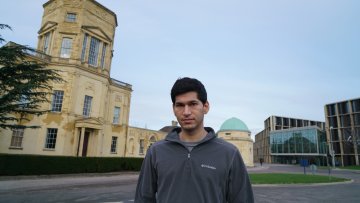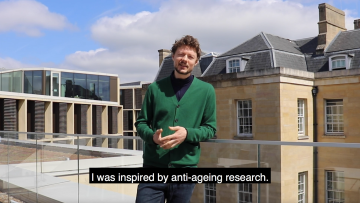Groups and Geometry in the South East
Property (T) and random quotients of hyperbolic groups
1:30
Calum Ashcroft (Cambridge)
In his original manuscript on hyperbolic groups, Gromov asked whether random quotients of non-elementary hyperbolic groups have Property (T). This question was later refined by Ollivier, and then answered in the case of random quotients of free groups by Zuk (and Kotowski--Kotowski).
In this talk we answer the Gromov--Ollivier question in the affirmative. We will discuss random quotients and some of their properties, in particular with relation to Property (T).
Connections between hyperbolic geometry and median geometry
2:45
Cornelia Drutu (Oxford)
In this talk I shall explain how groups endowed with various forms of hyperbolic geometry, from lattices in rank one simple groups to acylindrically hyperbolic groups, present various degrees of compatibility with the median geometry. This is joint work with Indira Chatterji, and with John Mackay.
TEA
3:45
Division, group rings, and negative curvature
4:00
Grigori Avramidi (Bonn)
In 1997 Delzant observed that fundamental groups of hyperbolic manifolds with large injectivity radius have nicely behaved group rings. In particular, these rings have no zero divisors and only the trivial units. In this talk I will explain how to extend this observation to show such rings have a division algorithm (generalizing the division algorithm for group rings of free groups discovered by Cohn) and that these group rings have``freedom theorems’’ showing that all of their ideals that are generated by few elements are free, where the specific value of `few’ depends on the injectivity radius of the manifold (which can be viewed as generalizations from subgroups to ideals of some freedom theorems of Delzant and Gromov). This has geometric consequences to the homotopy classification of 2-complexes with surface fundamental groups and to complexity of cell structures on hyperbolic manifolds.
Oxford Mathematician Jared Duker Lichtman explains his fascination and frustration with a conjecture that has puzzled mathematicians for years.
The orbit method and normality of closures of nilpotent orbits
Abstract
The work of Kraft-Procesi classifies closures of nilpotent orbits that are normal in the cases of classical complex Lie algebras. Subsequent work of Ranee Brylinsky combines this work with the Theta correspondence as defined by Howe to attach a representation of the corresponding complex group. It provides a quantization of the closure of a nilpotent orbit. In joint work with Daniel Wong, we carry out a detailed analysis of these representations viewed as (\g,K)-modules of the complex group viewed as a real group. One consequence is a "representation theoretic" proof of the classification of Kraft-Procesi.
Infinite-bin model and the longest increasing path in an Erdős-Rényi graph
Part of the Oxford Discrete Maths and Probability Seminar, held via Zoom. Please see the seminar website for details.
Abstract
We consider an oriented acyclic version of the Erdős-Rényi random graph: the set of vertices is {1,...,n}, and for each pair i < j, an edge from i to j is independently added to the graph with probability p. The length of the longest path in such a graph grows linearly with the number of vertices in the graph, and its growth rate is a deterministic function C of the probability p of presence of an edge.
Foss and Konstantopoulos introduced a coupling between these graphs and a particle system called the "Infinite-bin model". By using this coupling, we prove some properties of C, that it is analytic on (0,1], its development in series at point 1 and its asymptotic behaviour as p goes to 0.
A popular social media conjecture is that mathematics consists of a series of clever puzzles presented by a crew of witty magicians.
To test this, we spent the marvellous month of May travelling the Andrew Wiles Building, home to Oxford Mathematics, to find out what mathematicians actually do, and why.
In Episode 1 meet Jacobus, Maria and Sam.
Homological analysis of network dynamics
Abstract
Social, biological and physical systems are widely studied through the modeling of dynamical processes over networks, and one commonly investigates the interplay between structure and dynamics. I will discuss how cyclic patterns in networks can influence models for collective and diffusive processes, including generalized models in which dynamics are defined over simplicial complexes and multiplex networks. Our approach relies on homology theory, which is the subfield of mathematics that formally studies cycles (and more generally, k-dimensional holes). We will make use of techniques including persistent homology and Hodge theory to examine the role of cycles in helping organize dynamics onto low-dimensional manifolds. This pursuit represents an emerging interface between the fields of network-coupled dynamical systems and topological data analysis.




